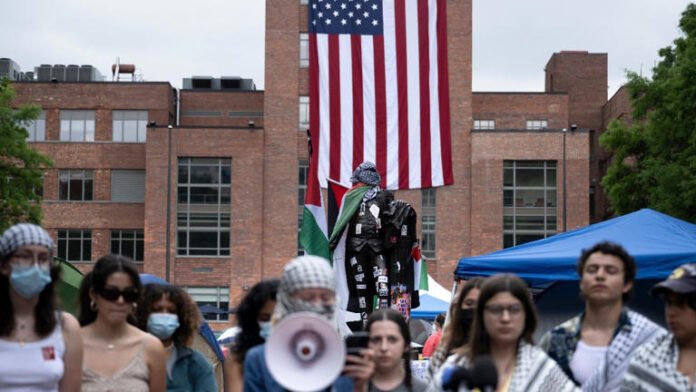A recent protest at a US university descended into chaos as pepper spray was used on Gaza war protesters, resulting in the arrest of 33 individuals. The incident, which unfolded against the backdrop of escalating violence in the Middle East, has reignited debates about freedom of expression, police response tactics, and the complexities of navigating contentious geopolitical issues on college campuses.
The protest, which took place at [University Name], was organized by students and activists in solidarity with Palestinians amid the latest wave of violence in the Gaza Strip. With emotions running high and opinions divided, the demonstration quickly became a flashpoint for confrontation and dissent. As tensions escalated, law enforcement officers deployed pepper spray in an attempt to disperse the crowd, leading to a chaotic and tumultuous scene.
The use of pepper spray on protesters has sparked widespread condemnation and raised questions about the appropriate use of force in quelling demonstrations. Critics argue that the response was excessive and disproportionate, infringing on the rights of individuals to engage in peaceful assembly and freedom of speech. They point to the chilling effect such tactics can have on dissent and the need for a more nuanced and de-escalatory approach to crowd control.
Furthermore, the incident has reignited conversations about the role of universities as spaces for free and open dialogue on contentious issues. Colleges and universities have long served as forums for robust debate, activism, and dissent, providing students with opportunities to engage with complex and controversial topics. However, the line between free expression and disruptive behavior can often become blurred, leading to clashes between conflicting ideologies and interests.
In the case of the Gaza war protests, the university found itself navigating a delicate balancing act between upholding academic freedom and ensuring campus safety. As tensions escalated and emotions ran high, administrators and law enforcement officials were faced with the challenging task of maintaining order while respecting the rights of protesters to voice their grievances.
Amidst the uproar and backlash following the pepper spray incident, calls have been made for a thorough investigation into the circumstances surrounding the use of force and the actions of law enforcement officers. Accountability and transparency are paramount in ensuring that such incidents are not repeated and that individuals’ rights are safeguarded in future protests and demonstrations.
Moreover, the incident underscores the broader implications of the Israel-Palestine conflict on college campuses and the challenges of navigating sensitive geopolitical issues in academic settings. As the conflict in the Middle East continues to unfold, students, faculty, and administrators must grapple with divergent perspectives, competing narratives, and deeply held beliefs that often intersect with identity, politics, and human rights.
In response to the incident, [University Name] has pledged to review its policies and protocols regarding protests and demonstrations on campus. Efforts are underway to engage stakeholders in dialogue and consultation to ensure that future demonstrations are conducted in a peaceful and respectful manner, while also upholding the principles of free expression and academic freedom.
Moving forward, the pepper spray incident at [University Name] serves as a sobering reminder of the challenges inherent in navigating contentious issues on college campuses and the importance of fostering an environment that encourages dialogue, empathy, and understanding. As universities strive to uphold their values of inclusivity, diversity, and intellectual inquiry, it is essential that they remain vigilant in safeguarding the rights and well-being of all members of their communities, even in the face of disagreement and dissent.
Additionally, the incident underscores the need for ongoing dialogue and education around issues of social justice, human rights, and international conflict. By fostering opportunities for constructive engagement and mutual understanding, universities can play a pivotal role in promoting empathy, tolerance, and critical thinking among their student bodies. Through workshops, seminars, and intercultural exchanges, students can gain the tools and perspectives needed to navigate complex global issues with nuance and sensitivity, ultimately contributing to a more informed and compassionate society.

